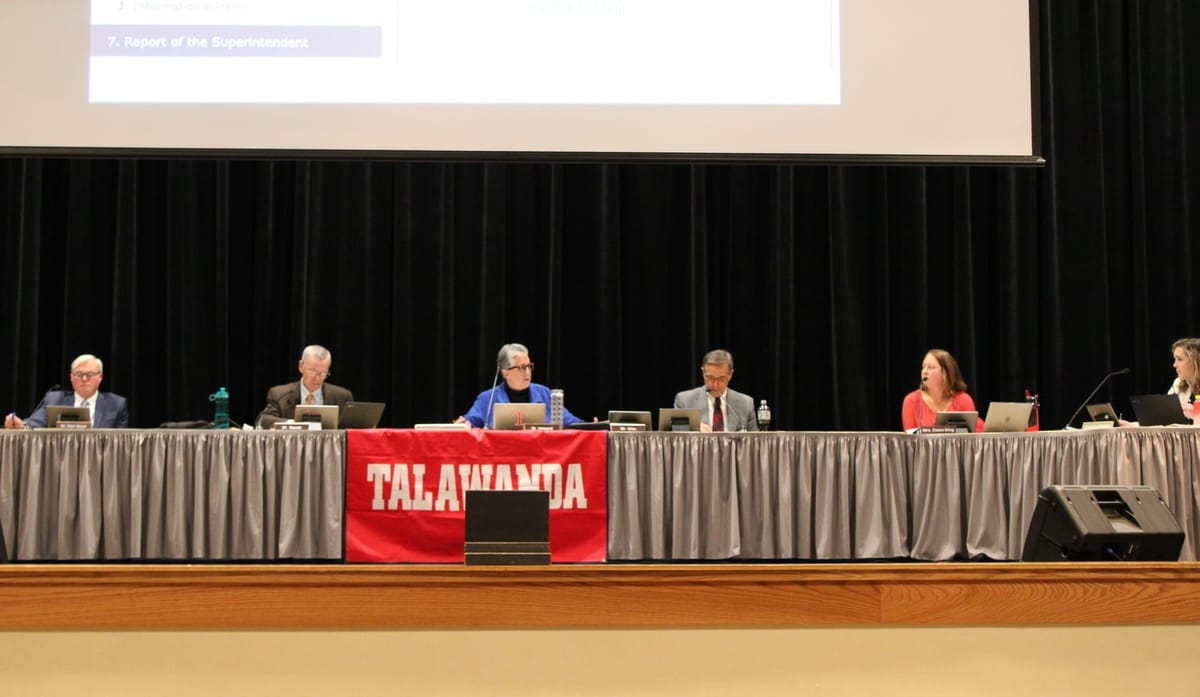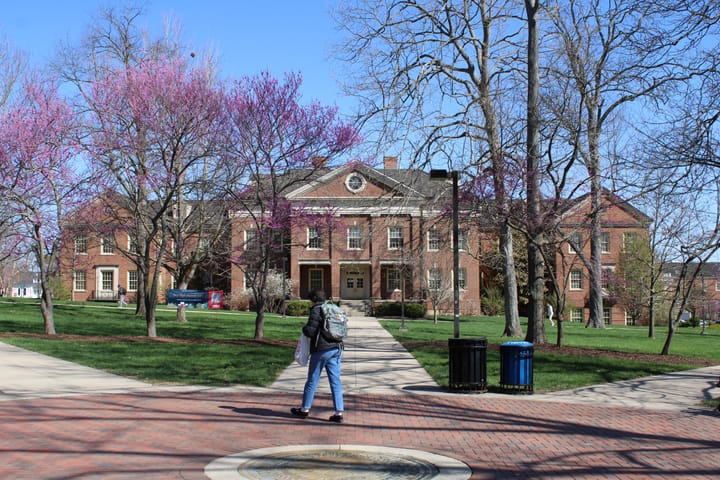Google Calendar settings lead to security concerns at Talawanda; board considers creation of new staff positions
The Talawanda School District has changed its Google Suite privacy settings and met with staff to provide "additional training" after a community member expressed security concerns at a Dec. 19 board meeting.

The Talawanda School District is facing allegations of FERPA violations related to the district’s use of Google Calendar.
During a school board meeting Dec. 19, Scotty King, husband of current board member Dawn King, read a statement he said a district parent had shared with him regarding the district’s Google Calendar. While helping their child with an assignment, this parent discovered a way to access the calendars of teachers and administrators. These calendars included IEP meetings and disciplinary hearings for staff, as well as personal identifying information.
“This situation is concerning and likely constitutes another violation of FERPA regulation,” King read from the statement. “The parents whose children attend this school district have the right to know, as do the staff members whose privacy has been violated by the Talawanda administration by allowing for this information to be made accessible.”
In a statement provided to the Oxford Free Press and posted to the district blog Dec. 20, the district wrote that the “Google Suite setting issue” had allowed “students, staff, and third-party individuals with Talawanda email accounts to search and access Talawanda employee calendars.”
“The district immediately addressed the issue last night by changing the Google Suite Privacy settings for all,” the district wrote in the statement. “The settings were changed to the most restrictive setting. This stops internal staff, students, third-party individuals, and others using a student or staff member’s Talawanda device/email from accessing the calendars.”
District administrators also met with staff this morning to provide “additional training on how to utilize the necessary privacy settings” within Google technology. The issue is not unique to Talawanda, according to the statement, and the district is continuing to investigate the issue.
According to the U.S. Department of Education, schools must obtain “signed and dated written consent before an educational agency or institution discloses personally identifiable information from the student’s education records,” with limited exceptions. Districts may list some types of personally identifiable information as directory information, though parents have a “right to refuse to let the agency or institution designate any or all of those types of information about the student as directory information.”
Students who receive special education have additional privacy protections under the Individuals with Disabilities Education Act (IDEA). These protections are “tailored to special confidentiality concerns for children with disabilities and their families,” according to the National Center for Education Statistics.
Toward the end of the board meeting, Dawn King said she was confused about the situation, and Superintendent Ed Theroux said the district would address it.
“If that’s true, that individual should’ve gone to the superintendent and said, ‘You have a security issue, let’s solve it,’” Board Member Pat Meade said. “By bringing it out in public, then people will go test that out, and you will actually have people looking at people’s IEPs.”
District approves policy changes, introduces new state-mandated policy
At last month’s meeting, Director of Human Resources Mike Malone introduced recommended changes and additions impacting 44 individual policies and bylaws. Those changes included updated guidance for the use of personal devices, as well as new policies regarding the use of artificial intelligence. Those resolutions passed at this month’s board meeting with little discussion.
Malone introduced another policy during the Dec. 19 policy which is newly mandated by the state. House Bill 214, a Republican-backed bill which passed along party lines this summer, requires all Ohio districts to adopt a policy stating that students and staff do not have to adhere to specific beliefs or principles regarding politics and ideology.
Talawanda’s proposed policy states that the Board of Education “is committed to establishing a school and work environment that supports the free exchange of ideas and allows employees and students to maintain their own beliefs, affiliations, ideals, political opinions, and ideology without fear of repercussions."
At the end of the board meeting, after the policy changes had passed, King said she had reached out to Neola for clarification regarding the policies that dictate communications between board members and district employees. The district has no policy preventing board members and administrators from reaching out to one another. Two policies do prevent classified and certified staff from communicating with board members, but King said the representative she spoke to from Neola said those policies were focused on chain of command and personnel issues, not board matters or other discussions.
“I am personally tired of being told that I’m violating policy by reaching out to administrators, so no policy exists,” King said. “... [The Neola representative] also told me, and I quote, ‘You do not have a policy problem. You have a superintendent problem.’”
Two district policies, 3112 and 4112, state that “the basic line of communication” between teachers and staff and the Board of Education will “be through the superintendent.” Communications from district employees to the board should be submitted to the superintendent, who will then forward the communications to the board, while communications from the board to staff “will generally be communicated through the Superintendent.”
Neither policy describes specific permissible and impermissible communications, though both do include exceptions for interacting at social gatherings. “Board members and members of the staff should not discuss individual personalities, personnel grievances, or other complaints” at social functions, according to the policies.
Increased spending proposals met with public scrutiny
Following a five-year forecast at the board’s November meeting which showed the district better off by $1.7 million than the five-year forecast in May, Meade asked superintendent Ed Theroux and treasurer Shaunna Tafelski to come up with proposals for investing more money in educational initiatives.
Theroux presented several potential staffing additions he said could address the school district’s current needs during the Dec. 19 meeting. Those positions included one elementary title teacher, two elementary teachers to reduce class size, a psychologist for Talawanda Middle School, a district-level instructional coach focused on improving teaching and curriculum, and a half-time counselor at Talawanda High School. Theroux estimated the cost of the positions at roughly $400,000 in the first year, though he warned that the quality of applicants could push the costs in either direction.
“We had lots of input for it,” Theroux said. “Everybody would love to see us bring back some other stuff, too. $400,000 seems like a long way, but if you look at the list, it does not.”
Treasurer Shaunna Tafelski ran two cost estimates if the district were to hire for all of the positions — one based on a $360,000 first year cost and another based on a $485,000 first year cost. Under those estimates, the additions could cost the district between $1.8 million and $2.5 million over the next five years once health insurance is factored in.
The board did not take any action to create new positions during the meeting. If board members do want to create new positions, Theroux said they will need to decide by March to allow for proper budgeting.
During public comment, Hanover Township resident Mike Dittman said the district will end up in a similar position to 2022 when residents voted to reject a new levy if the board chooses to increase spending. Dittman said the district spends more than similar districts in the county per pupil, and he wants to see costs brought down.
“Now, some of the same board members who mismanaged our funds in the past are calling for additional spending,” Dittman said. “It’s amazing to me. This approach will again bring us to financial crisis.”
According to Ohio’s 2024 district report cards, Talawanda spent $12,208 per student last year, above every other Butler County district except New Miami. The median spending per student across Greater Cincinnati — Butler, Clermont, Hamilton and Warren Counties — was $11,648.
While the board didn’t approve any new positions, board members did vote unanimously to approve a contract for a new turf field at the high school. During a presentation to the board in September, Athletic Director Jake Richardson said the high school’s current field is 13 years old and had increasing maintenance and safety concerns.
“We’ve maximized its lifespan … Turf fields are warranted for eight years. You’re expected to get about 10 out of them,” Richardson said at the September meeting.
The board will meet again on Saturday, Jan. 11 for an organizational meeting at 6 p.m. followed by a regular meeting at 7 p.m. Matt Wyatt, who was appointed to the board in late September following David Bothast’s resignation, was chosen as Pro Tem President of the board until the organizational meeting, when the board members will choose a president for the new year.




